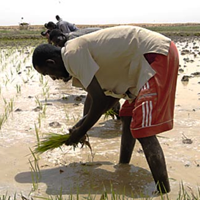
Growing awareness of how development outcomes are dependent on our variable and changing climate is focusing increasing attention on the role of climate information in agricultural development. Much of this attention is driven by the growing acceptance that human activity is altering the Earth’s climate, and that the major greenhouse gas emitters have an obligation to help the most vulnerable to adapt. Independently of the climate change agenda, however, most of the international development banks have recognized that their investments are vulnerable to climate shifts and fluctuations, and now have strategies for screening projects for climate vulnerability and for making […]
